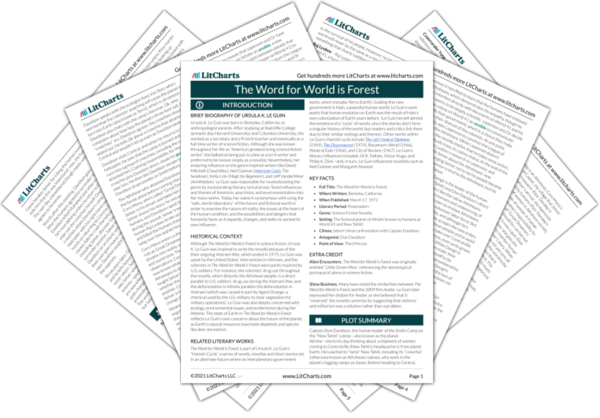Yumen Quotes in The Word for World is Forest
He went out to see what kind of trees they were. They all lay broken and uprooted. He picked up the silvery branch of one and a little blood ran out of the broken end. No, not here, not again, Thele, he said: O Thele, come to me before your death! But she did not come. […] Outside the other door, across the tall room, was the long street of the yumen city Central. Selver had the gun in his belt. If Davidson came, he could shoot him. He waited, just inside the open door, looking out into the sunlight. Davidson came, huge, running so fast that Selver could not keep him in the sights of the gun as he doubled crazily back and forth across the wide street, very fast, always closer. The gun was heavy. Selver fired it but no fire came out of it, and in rage and terror he threw the gun and the dream away.
“[…] Much of what he told me, I couldn’t understand. It wasn’t the language that kept me from understanding; I know his tongue, and he learned ours; we made a writing of the two languages together. Yet there were things he said I could never understand. He said the yumens are from outside the forest. That’s quite clear. He said they want the forest: the trees for wood, the land to plant grass on.” Selver’s voice, though still soft, had taken on resonance; the people among the silver trees listened. “That too is clear, to those of us who’ve seen them cutting down the world. He said the yumens are men like us, that we’re indeed related, as close kin maybe as the Red Deer to the Greybuck. He said that they come from another place which is not the forest; the trees there are all cut down; it has a sun, not our sun, which is a star. All this, as you see, wasn’t clear to me. I say his words but don’t know what they mean. It does not matter much. It is clear that they want our forest for themselves […] ”
The townsfolk also knew that the 1200 slaves at Centralville had been freed soon after the Smith Camp massacre, and Lyubov agreed with the Colonel that the natives might take the second event to be a result of the first. That gave what Colonel Dongh would call ‘an erroneous impression,’ but it probably wasn’t important. What was important was that the slaves had been freed. Wrongs done could not be righted; but at least they were not still being done. They could start over: the natives without that painful, unanswerable wonder as to why the ‘yumens’ treated men like animals; and he without the burden of explanation and the gnawing of irremediable guilt.












